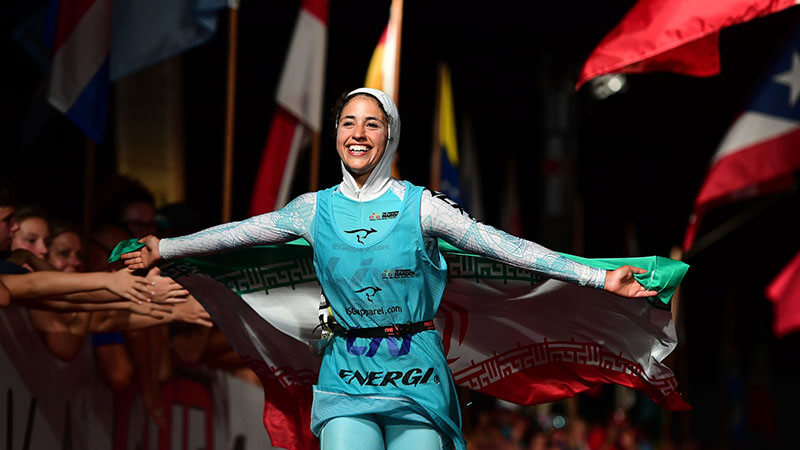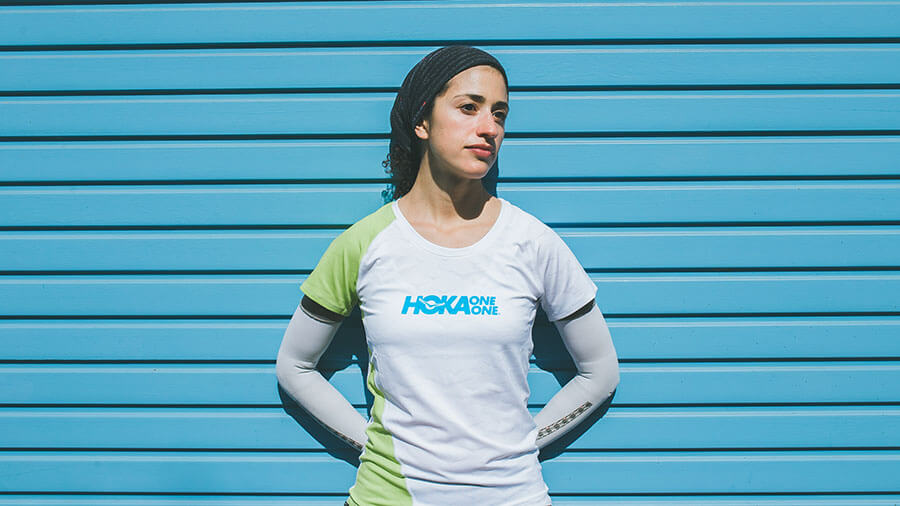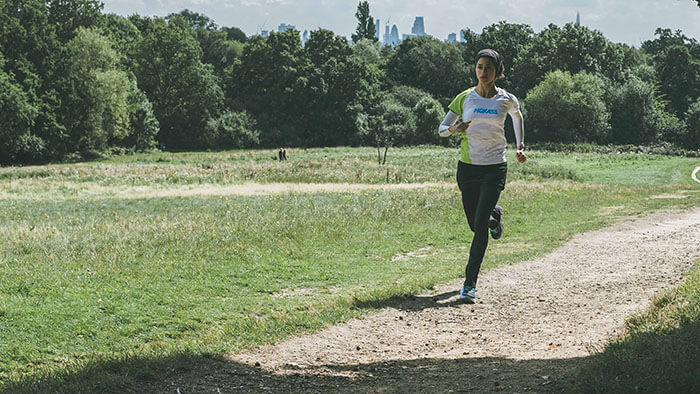
Triathlete Shirin Gerami’s persistence in pushing Iran to allow her, as a woman, to compete led to a win that transcends sport. Her journey is the latest in our Huck x HOKA series, looking at mavericks who found a new perspective through running.
The night before racing in a triathlon most people keep things fairly relaxed. They’ll pack their bags, perhaps eat a giant plate of pasta, piled up high like a pyramid, and have an early night. But before her first World Championships Shirin Gerami was doing none of those things.
Instead, she was rushing around trying to get government permission just to compete in the event. To represent Iran, she needed the okay from the Ministry of Sports there and for the past six months the answer had been a consistent and resounding “No.”
Then suddenly, hours before the race, she got an email confirming she was allowed to compete and Shirin Gerami became the first-ever woman to represent Iran in a world triathlon competition. A mould-breaking moment.
Breaking the mould
Her journey to that point was as improbable as it is inspiring. Starting with the fact she had zero interest in sport as a child, which isn’t surprising because in Iran, where she was born and lived from the ages of 10 to 15, girls aren’t encouraged to play sport. “In the schools I went to, phys-ed was quite weak,” she says. “It was never a seriously sporty session. It was more girls sitting around a courtyard reading books.”
She did however love nature and hiking. “I was around 13 when my mum’s cousin, who always loved hiking and the outdoors, told me I should go hiking with her in the [Alborz] mountains, which Tehran [where she lived] is at the foot of. She seemed to know every single person there and she introduced me and said, ‘If you ever see her, take care of her.’”

After that, Shirin would go hiking in the mountains before school most days, leaving at 4 or 5 a.m. in her school uniform. “I’d come down smelly and sweaty and go to school,” she laughs.
When she was 18, she and two friends spontaneously took a hiking trip from Tehran to the Caspian Sea. They were having an amazing time until the fifth night when they got attacked in their tent by a group of men with “large daggers and knives fit to cut off the carcass of sheep.”
The experience was transformative for Shirin, causing her to be diagnosed with a mental illness, but also helping her realise that sport was her way back. “Anytime I’ve gone through a down or hard times,” she says, “it’s always been sports and the outdoors that helped me come back up again from the depths of downness.”
Starting out in triathlon
She went to university at Durham in England, and in her final year found the courage to try triathlon. “I didn’t consider myself sporty in anyway. Triathlon seemed totally impossible and out of my reach but I like an adventure…”
Still, she was completely intimidated at the start. “I was the last person in the slowest lane in the pool, I had to walk my bike up the hill and I was the one who was getting lapped on the track,” she says.
But she kept going and made progress. The thought of racing terrified Shirin but she’d made good friends in the sport and they persuaded her to try. At each stage of her first race, she expected to be stopped for going too slowly. But she never was.

Was she euphoric at the finish line? “It was more the realisation that we underestimate ourselves daily. We don’t show up to the start line; we give up before having even tried.”
She moved to London for work and joined a triathlon club “for the fun and love of it.” Then ahead of the ITU World Championships, which in 2013 were taking place in London, she was chatting with some triathlon friends about the various nationalities that would be represented in the race. “We all laughed and joked and said, ‘Iran, haha well that’s not going to be possible.’ But that night I thought, ‘Hang on. You dismissed something, without actually exploring it.’”
Making the grade
The next morning she called up the triathlon federation in Iran and asked why exactly women couldn’t race. After many questions, the first tangible thing she found was it had to do with clothing and Iran’s non-negotiable stance on women covering up. Shirin thought this would be a simple thing to solve, but it took her six months of sourcing various outfits, and pictures and emails and flights to Iran before the Ministry of Sports delivered that magical “Yes.”
Race day was the first time she’d worn her sanctioned outfit, which included a hijab. The kit was not the easiest thing to compete in, but in that first race, Shirin wasn’t worrying about that. “The relief of getting the permission was beyond anything, I wasn’t thinking, ‘Oh it feels a little heavy.’”
Four years on from that ground-breaking race, she has many more triathlons under her belt including the iconic Ironman World Championship in Kona, Hawaii, which she did last year. Thirteen hours of hardcore exercise over 140.6 miles, all in a hijab, covered to her wrists and toes.

She still feels there’s room for improvement in terms of kit that women can compete in fairly and safely while adhering to strict Islamic codes. “Some people find arts therapy, some people find sports therapy… I dream of a world where everyone could access sports — should they want to. And if clothing really is the area that is stopping you from accessing sport, then I think that’s something that needs to be looked at.”
But Shirin’s legacy is already in full effect. She’s inspired women all over the world, and in 2017, Iran sent a team of female triathletes to the Central Asian Championships for the first time, which was “very uplifting” for her.
“I hope these opportunities will continue growing,” she says. “In the UK, I rock up to whatever club I want to join and start training. It’s as a simple as that. Whereas if I’d been a girl living in Iran, I would not for one second have known what a triathlon was. And I’d have missed out on the confidence, empowerment and joy it’s brought to my life.”
Huck is a youth culture channel. It celebrates and explores independent culture — people and movements that paddle against the flow. Find out more about HUCK.
Learn more about the innovative Clifton trainers Shirin wears.